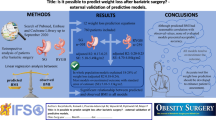Abstract
Introduction
Different factors, such as age, gender, preoperative weight but also the patient’s motivation, are known to impact outcomes after Roux-en-Y gastric bypass (RYGBP). Weight loss prediction is helpful to define realistic expectations and maintain motivation during follow-up, but also to select good candidates for surgery and limit failures. Therefore, developing a realistic predictive tool appears interesting.
Patients/Methods
A Swiss cohort (n = 444), who underwent RYGBP, was used, with multiple linear regression models, to predict weight loss up to 60 months after surgery considering age, height, gender and weight at baseline. We then applied our model on two French cohorts and compared predicted weight to the one finally reached. Accuracy of our model was controlled using root mean square error (RMSE).
Results
Mean weight loss was 43.6 ± 13.0 and 40.8 ± 15.4 kg at 12 and 60 months respectively. The model was reliable to predict weight loss (0.37 < R2 < 0.48) and RMSE between 5.0 and 12.2 kg. High preoperative weight and young age were positively correlated to weight loss, as well as male gender. Correlations between predicted weight and real weight were highly significant in both validation cohorts (R ≥ 0.7 and P < 0.01) and RMSE increased throughout follow-up between 6.2 and 15.4 kg.
Conclusion
Our statistical model to predict weight loss outcomes after RYGBP seems accurate. It could be a valuable tool to define realistic weight loss expectations and to improve patient selection and outcomes during follow-up. Further research is needed to demonstrate the interest of this model in improving patients’ motivation and results and limit the failures.



Similar content being viewed by others
References
Angrisani L, Santonicola A, Iovino P, et al. Bariatric surgery and endoluminal procedures: IFSO Worldwide Survey 2014. Obes Surg. 2017;27:2279–89.
Suter M, Giusti V, Worreth M, et al. Laparoscopic gastric banding: a prospective, randomized study comparing the Lapband and the SAGB: early results. Ann Surg. 2005;241:55–62.
Caiazzo R, Lassailly G, Leteurtre E, et al. Roux-en-Y gastric bypass versus adjustable gastric banding to reduce nonalcoholic fatty liver disease: a 5-year controlled longitudinal study. Ann Surg. 2014;260:893–8. discussion 898–899
Kaly P, Orellana S, Torrella T, et al. Unrealistic weight loss expectations in candidates for bariatric surgery. Surg Obes Relat Dis. 2008;4:6–10.
Sjöström L, Lindroos A-K, Peltonen M, et al. Lifestyle, diabetes, and cardiovascular risk factors 10 years after bariatric surgery. N Engl J Med. 2004;351:2683–93.
Fischer L, Nickel F, Sander J, et al. Patient expectations of bariatric surgery are gender specific—a prospective, multicenter cohort study. Surg Obes Relat Dis. 2014;10:516–23.
Wise ES, Hocking KM, Kavic SM. Prediction of excess weight loss after laparoscopic Roux-en-Y gastric bypass: data from an artificial neural network. Surg Endosc. 2016;30:480–8.
Skogar ML, Sundbom M. Duodenal switch is superior to gastric bypass in patients with super obesity when evaluated with the bariatric analysis and reporting outcome system (BAROS). Obes Surg. 2017;27:2308–16.
Gelinas BL, Delparte CA, Hart R, et al. Unrealistic weight loss goals and expectations among bariatric surgery candidates: the impact on pre- and postsurgical weight outcomes. Bariatr Surg Pract Patient Care. 2013;8:12–7.
Lanyon RI, Maxwell BM. Predictors of outcome after gastric bypass surgery. Obes Surg. 2007;17:321–8.
Livhits M, Mercado C, Yermilov I, et al. Patient behaviors associated with weight regain after laparoscopic gastric bypass. Obes Res Clin Pract. 2011;5:e169–266.
Livhits M, Mercado C, Yermilov I, et al. Preoperative predictors of weight loss following bariatric surgery: systematic review. Obes Surg. 2012;22:70–89.
Fox B, Chen E, Suzo A, et al. Dietary and psych predictors of weight loss after gastric bypass. J Surg Res. 2015;197:283–90.
Sillén L, Andersson E. Patient factors predicting weight loss after Roux-en-Y gastric bypass. J Obes. 2017;2017(3278751):1–6.
Author information
Authors and Affiliations
Corresponding author
Ethics declarations
Conflict of Interest
The authors declare that they have no conflict of interest.
Ethical Approval
All procedures performed in studies involving human participants were in accordance with the ethical standards of the institutional and/or national research committee and with the 1964 Helsinki declaration and its later amendments or comparable ethical standards.
Informed Consent
Informed consent was obtained from all individual participants included in the study.
Electronic Supplementary Material
ESM 1
(XLSX 36 kb)
Rights and permissions
About this article
Cite this article
Seyssel, K., Suter, M., Pattou, F. et al. A Predictive Model of Weight Loss After Roux-en-Y Gastric Bypass up to 5 Years After Surgery: a Useful Tool to Select and Manage Candidates to Bariatric Surgery. OBES SURG 28, 3393–3399 (2018). https://doi.org/10.1007/s11695-018-3355-0
Published:
Issue Date:
DOI: https://doi.org/10.1007/s11695-018-3355-0




